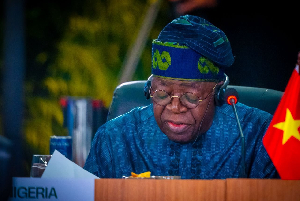Business News of Tuesday, 30 September 2025
Source: Oluwole Dada, Contributor
The golden rule in leadership dynamics
The Golden Rule is a universal truth that has transcended time: "Do unto others as you would have them do unto you." Let's transpose this rule onto the leadership spectrum and this is as simple and profound as treating your team members the same way you would want your son or daughter to be treated in the workplace.
Simply said, empathy and respect for others should be the bedrock of any transformational leader. Picture a scenario where your son or daughter is being reprimanded with a high volume of tone and extreme harshness. Imagine your son’s supervisor unjustly criticizing him for an error that isn’t his fault. These scenarios evoke discomfort because they mirror potential flaws in leadership approach.
In the bustling corridors of corporate power, where ambition and productivity often overshadow empathy, there is the possibility to overlook the humanity that should exist in the workplace. The Golden Rule has the potential to revolutionize workplace dynamics.
If all managers can apply this introspective filter, before making decisions or interacting with their teams, the office environment would be significantly more uplifting and motivating. Regrettably, some leaders have fostered a hostile work environment due to a lack of understanding and empathy, adversely affecting many employees. For emphasis, only do things you would be comfortable with if a manager did the same to your son or daughter.
Integrating the Golden Rule into leadership practices can indeed make the workplace a more vibrant and productive space, benefiting both the employees and the organization.
Indra Nooyi's leadership style at PepsiCo exemplified the power of leading with empathy. Known for her compassionate approach, Nooyi often personalized her interactions with her employees. She pioneered an initiative to write letters to employees' parents, acknowledging their contributions to the company. This gesture highlighted her belief in treating her team as an extended family, a principle reflective of the Golden Rule.
In doing so, not only did Nooyi foster loyalty and motivation among her team, but she also demonstrated how empathy and understanding can bridge the gap between leadership and execution. Ultimately, effective leadership boils down to empathy, respect, and treating others as you would like your closest family to be treated.
On the other hand, many have made the workplace a hellish landscape, punctuated by ridicule, maltreatment, and a crushing sense of worthlessness. This is a tragedy, but it doesn't have to be this way. By adopting the Golden Rule, we can transform our offices into bastions of mutual respect, creativity, and fulfilment.
We can attempt to move away from authority-driven tactics and leaning towards a model of leadership that emphasizes connection, compassion, and support. We can ensure a culture where respect fosters collaboration and where leaders nurture potential rather than constrain it. We can create an environment where treating others well isn’t the exception but the norm.
Southwest Airlines, under Herb Kelleher’s leadership demonstrated the golden rule. Kelleher famously said he would rather hire someone with a great attitude and teach them skills than hire someone with great skills and a poor attitude. More importantly, he treated every employee like family members.
During the post 9/11 crisis that devastated the airline industry, while competitors were conducting mass layoffs, Kelleher found creative ways to avoid letting people go. He asked himself the same question similar to the Golden Rule: “Would I abandon my own children during tough times?” The result of this was that Southwest was one of the few airlines to remain profitable during that period, largely because employees went above and beyond to help the company survive. They didn’t do it out of fear; they did it out of love and loyalty for a leader who had consistently treated them with dignity.
Contrast this with Uber’s early days under Travis Kalanick. His “always be hustling” mentality normalized aggression. Managers publicly shamed underperformers, and turnover spiked. When a female engineer exposed systemic harassment, Kalanick’s dismissive response sparked global outrage. The result was a toxic brand reputation, lawsuits and his eventual ouster. Employees who were treated like expendable cogs revolted. His leadership style was reportedly aggressive, leading to a toxic work environment. This poor treatment led to loss of trust from team members.
Finally, I would like to challenge every manager. For one week, approach every interaction with your team as if you were dealing with your own flesh and blood. Watch how it changes not just your leadership style, but the very fabric of your workplace culture. After all, in the issues of life, we are all someone's child, deserving dignity and respect.
Remember, true leadership isn't about wielding power; it's about empowering others. The workplace does not need to be a gladiatorial arena where only the toughest survive. It can and should be a nurturing ground where talents are cultivated, mistakes are learning opportunities, and respect is the currency of choice.
Oluwole Dada is the General Manager at SecureID Limited, Africa’s largest smart card manufacturing plant in Lagos, Nigeria.












